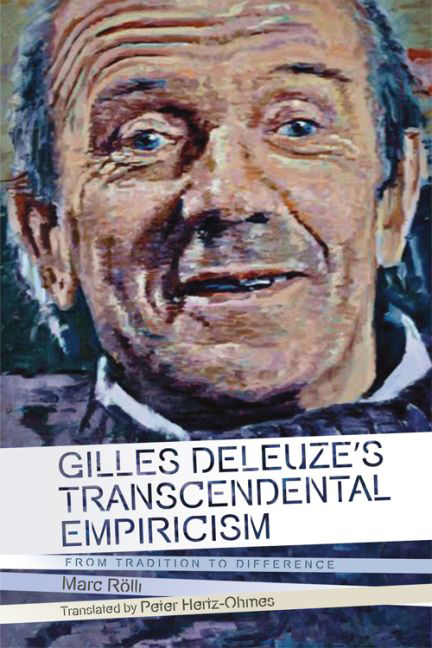Book contents
- Frontmatter
- Contents
- Translator's Note
- Author's Foreword
- Introduction: Can Empiricism Have a Transcendental Aspect?
- PART I EMPIRICISM/TRANSCENDENTALISM
- PART II FROM PHENOMENON TO EVENT
- 4 Husserl's Concept of Passive Synthesis
- 5 Heidegger's Metaphysics of Finitude
- PART III DELEUZE'S TRANSCENDENTAL EMPIRICISM
- Conclusion: Where Do We Go from Here? Lines of Flight
- Bibliography
- Index
5 - Heidegger's Metaphysics of Finitude
from PART II - FROM PHENOMENON TO EVENT
Published online by Cambridge University Press: 27 April 2017
- Frontmatter
- Contents
- Translator's Note
- Author's Foreword
- Introduction: Can Empiricism Have a Transcendental Aspect?
- PART I EMPIRICISM/TRANSCENDENTALISM
- PART II FROM PHENOMENON TO EVENT
- 4 Husserl's Concept of Passive Synthesis
- 5 Heidegger's Metaphysics of Finitude
- PART III DELEUZE'S TRANSCENDENTAL EMPIRICISM
- Conclusion: Where Do We Go from Here? Lines of Flight
- Bibliography
- Index
Summary
Being shrouds itself in the enowning event [Sein verschwindet im Ereignis].
(Heidegger 2000b: 22, trans. mod.)It is a fact that Heidegger's radicalisations of Husserl's phenomenology were greeted in a productive way, especially in France. The ‘primary works’ of French phenomenology, Sartre's Being and Nothingness (1943) and Merleau-Ponty's Phenomenology of Perception (1945), are strongly influenced by Heidegger and inconceivable without Being and Time (1927). In addition, Heidegger's critique of subject-centred reason, presented after his ‘turning away’ (Abkehr) from metaphysics, has led to important new developments in the course of phenomenological thinking. I need only mention The Visible and the Invisible (1964) by Merleau-Ponty, Totality and Infinity (1961) by Levinas, Speech and Phenomena (1967) by Derrida and The Order of Things (1966) by Foucault. These works put a stop to the indiscriminate dismissal of Heidegger's late works. To be sure, we also see in them the beginning of a more nuanced, mostly less than favourable and usually politically motivated critique of his philosophy as a whole. To put it somewhat simply, the aforementioned authors take from Heidegger the insight that the recently dominating image of representational thinking rests in a subjective logic of recognition that ‘overlooks’ ontological difference. But they all contend that the negligence of difference as such cannot be inserted into the ‘grand narrative’ of the history of Being in a way that would allow Heidegger to regain for philosophy its full measure of authority.
Gilles Deleuze also expresses this ambivalent attitude. On the one hand he links the necessary radicalism of difference directly to Heidegger's insistence on leveraging out (aushebeln) the negationtheoretical basis of the Hegelian dialectic, while on the other hand he traces Heidegger's ‘good pages’ back to his latent Nietzscheanism (Deleuze 1994: 201). Yet from his assertion that ‘Heidegger is Nietzsche's potential, but not the other way around’ (Deleuze 1988b: 113), one can conclude not only that Heidegger's critique of Nietzsche is highly questionable in Deleuze's eyes, but that in any case Heidegger's all too rapid assignment of technology to an inattention to Being will need overhauling. Clearly the decisive points that make Heidegger's metaphysics of finitude interesting for Deleuze and his working out of the philosophy of difference need to be discussed.
- Type
- Chapter
- Information
- Gilles Deleuze's Transcendental EmpiricismFrom Tradition to Difference, pp. 128 - 154Publisher: Edinburgh University PressPrint publication year: 2016



